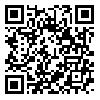Volume 29, Issue 4 (7-2021)
JSSU 2021, 29(4): 3630-3641 |
Back to browse issues page
Download citation:
BibTeX | RIS | EndNote | Medlars | ProCite | Reference Manager | RefWorks
Send citation to:



BibTeX | RIS | EndNote | Medlars | ProCite | Reference Manager | RefWorks
Send citation to:
Eftekhari A, Bakhtiari M. Evaluation of Behavioral Immune System and its Unique Effect on Prejudice and Stigmatization in Patients with Infectious Diseases. JSSU 2021; 29 (4) :3630-3641
URL: http://jssu.ssu.ac.ir/article-1-5239-en.html
URL: http://jssu.ssu.ac.ir/article-1-5239-en.html
Abstract: (2374 Views)
Introduction: Behavioral immune systems allow organisms to detect the presence of disease-causing pathogens in their environment more immediately and engage in behaviors that prevent them from coming into contact with objects and individuals. There is extensive research linking behavioral immune systems to a variety of prejudices. These prejudices cause labeling and ultimately social stigma on these people. Therefore, the present study investigated the behavioral safety system and its unique effect on prejudice and stigmatization in people with infectious diseases.
In this review study, the research literature was searched through Google Scholar and PubMed with the words "Behavioral Immune System, Prejudice, Stigmatization", and the relevant authorities were included in this study. Research has shown that people tend to associate illness with obesity, the manifestation of facial symptoms, physical disability, and foreign nationality in order to avoid becoming ill by predicting illness and thus overreacting to them. These reactions occur in many groups of people who do not actually have the contagious disease and are called a type of psychological allergy. These prejudicial reactions and labeling can cause social distress for these people and their long-term social isolation.
Conclusion: Disgust is triggered in response to pathogen-related stimuli and is associated with unique patterns of autonomic nervous system activity and neural activity, but in functional connections between anatomical structures, chemical neurological processes, and various cognitive and behavioral phenomena, the genetic structure is involved. Demonstrating behavioral immunity, there is not much information and more study is needed.
In this review study, the research literature was searched through Google Scholar and PubMed with the words "Behavioral Immune System, Prejudice, Stigmatization", and the relevant authorities were included in this study. Research has shown that people tend to associate illness with obesity, the manifestation of facial symptoms, physical disability, and foreign nationality in order to avoid becoming ill by predicting illness and thus overreacting to them. These reactions occur in many groups of people who do not actually have the contagious disease and are called a type of psychological allergy. These prejudicial reactions and labeling can cause social distress for these people and their long-term social isolation.
Conclusion: Disgust is triggered in response to pathogen-related stimuli and is associated with unique patterns of autonomic nervous system activity and neural activity, but in functional connections between anatomical structures, chemical neurological processes, and various cognitive and behavioral phenomena, the genetic structure is involved. Demonstrating behavioral immunity, there is not much information and more study is needed.
Type of Study: Review article |
Subject:
Psychology
Received: 2020/09/27 | Accepted: 2020/12/19 | Published: 2021/07/1
Received: 2020/09/27 | Accepted: 2020/12/19 | Published: 2021/07/1
Send email to the article author
| Rights and permissions | |
 |
This work is licensed under a Creative Commons Attribution-NonCommercial 4.0 International License. |







